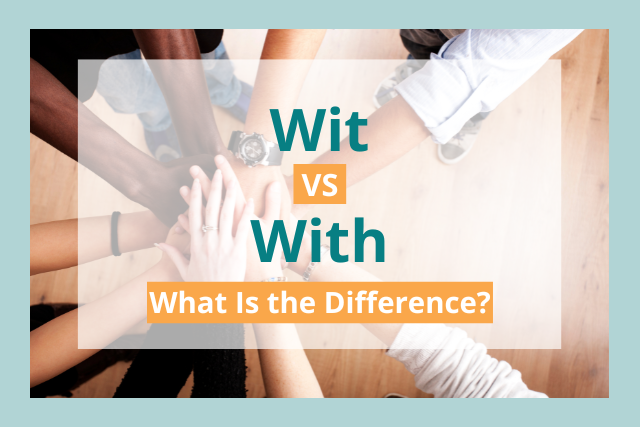
The words wit and with are often confused because they appear similarly. But what is the difference?
With means accompanied by when used as a preposition.
Wit means cleverness, intelligence, astuteness when used as a noun.
The Difference Between Wit vs With
It's easy to mistype words that are spelled similarly, like with and wit.
With is a preposition. It means "accompanied by, in relation to, or by the use of."
Wit is a noun. It means "cleverness, intelligence, mental sharpness and astuteness." Sometimes, it also refers to having a sense of humor or sanity.
Is the expression ', to wit' or ', to with'?
You should use ', to wit :'. These phrases are often confused because they look similar.
What's the right phrase 'to wit , the' or 'to with , the'?
The right phrase is 'to wit , the'. These phrases are often confused because of their similar spelling.
Should I use 'to wit , that' or 'to with , that'?
You should use 'to wit , that'. These phrases are often confused because they have a similar spelling.
Is the correct expression 'with respect to the' or 'wit respect to the'?
You should use 'with respect to the'. These phrases are often confused because they look similar.
Should it be 'nothing to do with' or 'nothing to do wit'?
The right expression is 'nothing to do with'. These phrases are often confused because they look similar.
Is the right expression 'in accordance with the' or 'in accordance wit the'?
The right expression is 'in accordance with the'. These phrases are often confused because they have a similar spelling.
Is the correct phrase 'to do with the' or 'to do wit the'?
The correct expression is 'to do with the'. These phrases are often confused because they have a similar spelling.
Should I use 'with regard to the' or 'wit regard to the'?
The right expression is 'with regard to the'. These phrases are often confused because they appear similar.
Some synonyms of wit are: humor, cleverness, intelligence, sharpness, sanity

